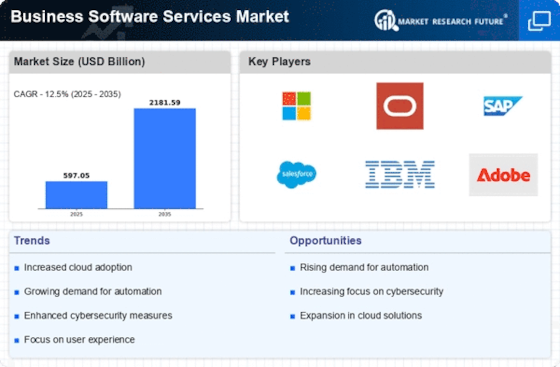Market Share
Business Software Services Market Share Analysis
The Business Software Services market is a dynamic and competitive environment, characterized by a wide array of companies offering diverse solutions to cater to the needs of businesses across various industries. In this terrain, market share positioning strategies are the key drivers of success and growth for companies in the industry. A series of major strategies are being implemented to achieve a dominant position in the market.
A common positioning approach in the Business Software Services market is through niche industry solutions. Companies aim at creating customized software services that target industries specific like healthcare, finance, manufacturing and trade. In an effort to become experts in specialized industries, companies need personalize their offerings by addressing the peculiar situation of each industry. This strategy provides an opportunity for businesses to showcase the depth of understanding required needs in a particular industry, which creates credibility and trust with potential customers looking for specialized solutions regarding their entities.
Another crucial element is the focus on cloud-based and mobile oriented solutions. In the process, there is a large proportion of companies that are emphasizing on developing cloud-based software services to provide smooth integration and mobility. Companies seek to meet the requirements of businesses looking for scalable and mobile-compatible solutions in efforts to facilitate flexibility, location independence, remote working. This emphasis on cloud-based and mobile friendly offerings is one of the primary attracting factors for customers that enjoy accessibility as well as flexibility in their selection of software solutions.
In addition, alliances and mergers contribute significantly to the position of market share in business software services niche. In a bid to improve the capacity and coverage of their software services, companies are forming alliances with top technology providers, integration partners as well as industry-specific platforms. The partnerships allow companies to provide one-stop shop solutions through offering integrations with widely used business platforms, creating smooth and linked services. Through association with leading technology and industry partners that are well known, organizations can improve in terms of market visibility enabling them to attract customers looking for all-inclusive and integrated software services.
Among other key aspects are industry-specific targeting and strategic partnerships, user experience and interface design have an important impact on market share position. The focus is on the formation of convenient and client-friendly interfaces, which should ensure smooth navigation through websites without significant efforts by customers. Thus, by focusing on accessibility and convenience of use companies can address a larger market base other than large corporations which may have enormous technical expertise. With this approach, companies can be framed as rendering user-oriented and available business software services that meet various needs of users. Moreover, thought leadership and brand positioning are integral components of market share strategies within the Business Software Services market. Companies are actively engaging in content creation, thought leadership initiatives, and participation in industry events to establish themselves as authoritative voices in the realm of business software solutions. By sharing valuable insights and best practices, companies can build credibility, trust, and visibility within the market, ultimately influencing customer perception and market share. Thought leadership efforts also contribute to strengthening brand identity and positioning companies as trusted advisors in the realm of Business Software Services.



















Leave a Comment